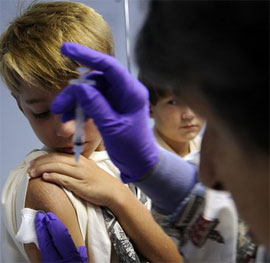Influenza A / H1N1 virus does not
On September 1, scientists at the University of Maryland (USA) published the results of a study showing that the influenza A / H1N1 virus , the culprit causing pandemic flu spread globally today, does not vary. and also do not associate with another seasonal influenza virus to become a more dangerous virus .

8-year-old Charlie Houley, is being vaccinated against influenza A / H1N1 (Photo: AP)
The study was published while some scientists feared that the A / H1N1 influenza virus could combine with other seasonal flu viruses to create a more dangerous super virus during the upcoming flu season. to the northern hemisphere.
Scientists have implanted 3 different flu viruses into some ferrets and observed that the A / H1N1 flu virus does not combine with the other two seasonal flu viruses, but on the other hand it separates the two types. the other virus. However, in transplanted animals, influenza A / H1N1 virus grows twice as fast as the other two viruses.
According to the researchers, some ferrets have been infected with the A / H1N1 influenza virus and one of the two seasonal flu viruses has had respiratory and gastrointestinal symptoms showing flu infection. Therefore, the research team believes that more research is needed to determine whether both the A / H1N1 virus and the seasonal influenza virus are responsible for some of the fatalities thought to be due to a new virus or not.
Dr. Anthony Fauci of the National Institute of Allergy and Infectious Diseases (NIAID) said that the results of the study showed that the influenza A / H1N1 virus overwhelmed the other two seasonal flu viruses and is also contagious. more . According to him, research by the University of Maryland scientists, although only an initial research result, also showed the need for a seasonal flu vaccine and A / H1N1 flu in the fall and upcoming winter.
- Influenza A / H1N1 outbreak in many parts of the world
- How dangerous is swine flu?
- Vaccination against H1N1 can cause neurological disorders
- Virus A / H1N1 is increasingly dangerous
- The new flu pandemic proves a controversial study
- Influenza A / H1N1 virus
- Vietnam successfully studied influenza A / H5N1 vaccine and influenza A / H1N1
- HCM City's first patient infected with H1N1 flu
- The second patient in the South died of H1N1 flu
- Discovering new compounds better than influenza A / H1N1 virus than Tamiflu
- Detecting the origin of influenza A (H1N1) virus
- The influenza A / H1N1 virus has reappeared in England and Belgium
 Green tea cleans teeth better than mouthwash?
Green tea cleans teeth better than mouthwash? Death kiss: This is why you should not let anyone kiss your baby's lips
Death kiss: This is why you should not let anyone kiss your baby's lips What is salmonellosis?
What is salmonellosis? Caution should be exercised when using aloe vera through eating and drinking
Caution should be exercised when using aloe vera through eating and drinking